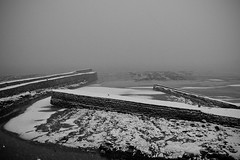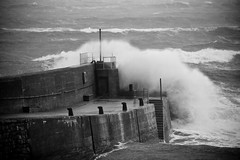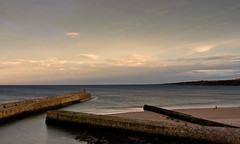dualities
It's a grey day and the sea's calm. The soft surf laps the shore with a fizz; it sounds like a fresh-poured gin and tonic.
A few days ago my flatmate and I threw a baseball around in the afternoon sun. Walkers were out in force, along with their dogs or partners, sometimes both. We got the odd look - baseball is uncommon in Scotland. The banter was about baseball; chat regarding the Red Sox and Spring Training, the state of the team and the league. In the afternoon sun the summer seems close and spring even closer.
The next morning I woke up to a ghostly grey light from the window. I staggered, yawning, and saw the harbour veiled in white, a deluge of snowflakes whipping past my window. It was still early, most of the snow untouched. I snapped a bunch of pics on my wanderings to and from work. As enthralling as the weather was the reaction to it. Every spare patch of snow found people building snowmen, every hill and incline found sledgers with hastily purchased and sometimes makeshift, improvised vehicles. It was like rain in the dessert; grown men and women sticking out their tongues to catch the snowflakes, the whistle of the odd snowball flying by my ear.
And now it's a grey day with calm, whispering seas. There's no sign of the snow. The lonely mounds of former snowmen, the last reminders of winter's last(?) hurrah have all melted away, leaving carrot noses and branch arms looking out of place and odd on their patches of grass. Former limbs are now just debris.
I look back on the last few days, from the afternoon sun to the fleeting blizzard and now to the mild calm, and I find some memorable nuggets. I took my UK citizenship test yesterday, and passed. Failure frightened me more for the ignomony than anything else. I can't mention the questions I was asked due to some sort of confidentiality agreement. They don't really matter. I knew the vast majority of them. I checked aftwards and think - think, mind you - I only got one wrong.
There's a ways to go yet. Passing the test is the first step towards UK citizenship. I've been here for 20 years and it's taken me this long to start looking towards getting a passport. It's always been on my mind. I don't think you can live more than half your life somewhere and not be changed somewhat by it. I think that duality suits me. It's not that I'm more American than British, or the other way around. I'm not entirely either, really. Ideas of loyalty and patriotism frequently confound me, though moreso how misaligned the judgement of those qualities seem to be. Instead I'll stick to my ideals, and remain loyal to those. I think that makes me a more valuable citizen of either country, and soon to be both.
Conflict will always exist, no doubt. I'll bristle at the odd barb against the States, especially those steeped in ignorance. Complaints about peculiarly British traits will continue to irk. But I've made peace with these things before, quite successfully. I remain intensely curious about both countries, their startling similarities and their vast chasms of difference.
It's just a piece of paper, a passport, a small sheet of legitimacy. Recognition for the duality I accepted a long time ago. It means little or everything, depending on my mood.
It's just me, standing on a beach on a grey day in Scotland, throwing a baseball while the sea whispers and fizzes, smiling at the odd looks cast my way.
A few days ago my flatmate and I threw a baseball around in the afternoon sun. Walkers were out in force, along with their dogs or partners, sometimes both. We got the odd look - baseball is uncommon in Scotland. The banter was about baseball; chat regarding the Red Sox and Spring Training, the state of the team and the league. In the afternoon sun the summer seems close and spring even closer.
The next morning I woke up to a ghostly grey light from the window. I staggered, yawning, and saw the harbour veiled in white, a deluge of snowflakes whipping past my window. It was still early, most of the snow untouched. I snapped a bunch of pics on my wanderings to and from work. As enthralling as the weather was the reaction to it. Every spare patch of snow found people building snowmen, every hill and incline found sledgers with hastily purchased and sometimes makeshift, improvised vehicles. It was like rain in the dessert; grown men and women sticking out their tongues to catch the snowflakes, the whistle of the odd snowball flying by my ear.
And now it's a grey day with calm, whispering seas. There's no sign of the snow. The lonely mounds of former snowmen, the last reminders of winter's last(?) hurrah have all melted away, leaving carrot noses and branch arms looking out of place and odd on their patches of grass. Former limbs are now just debris.
I look back on the last few days, from the afternoon sun to the fleeting blizzard and now to the mild calm, and I find some memorable nuggets. I took my UK citizenship test yesterday, and passed. Failure frightened me more for the ignomony than anything else. I can't mention the questions I was asked due to some sort of confidentiality agreement. They don't really matter. I knew the vast majority of them. I checked aftwards and think - think, mind you - I only got one wrong.
There's a ways to go yet. Passing the test is the first step towards UK citizenship. I've been here for 20 years and it's taken me this long to start looking towards getting a passport. It's always been on my mind. I don't think you can live more than half your life somewhere and not be changed somewhat by it. I think that duality suits me. It's not that I'm more American than British, or the other way around. I'm not entirely either, really. Ideas of loyalty and patriotism frequently confound me, though moreso how misaligned the judgement of those qualities seem to be. Instead I'll stick to my ideals, and remain loyal to those. I think that makes me a more valuable citizen of either country, and soon to be both.
Conflict will always exist, no doubt. I'll bristle at the odd barb against the States, especially those steeped in ignorance. Complaints about peculiarly British traits will continue to irk. But I've made peace with these things before, quite successfully. I remain intensely curious about both countries, their startling similarities and their vast chasms of difference.
It's just a piece of paper, a passport, a small sheet of legitimacy. Recognition for the duality I accepted a long time ago. It means little or everything, depending on my mood.
It's just me, standing on a beach on a grey day in Scotland, throwing a baseball while the sea whispers and fizzes, smiling at the odd looks cast my way.


